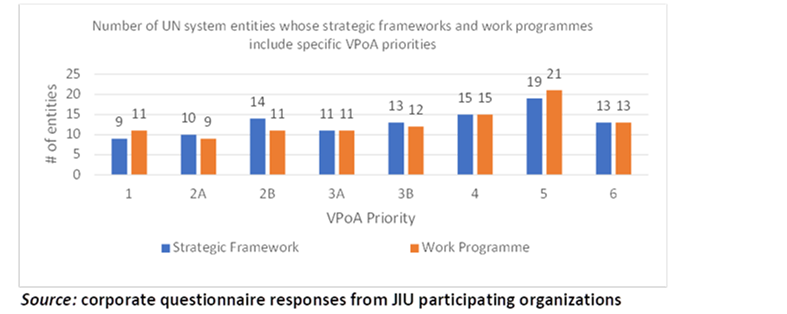- عربي
- 中文
- English
- Français
- Русский
- Español
Review of United Nations system support for landlocked developing countries to implement the Vienna Programme of Action (JIU/REP/2021/2)
The present report assesses the challenges, opportunities, good practices and lessons learned in the work of UN system organizations to support the 32 landlocked developing countries (LLDCs) to address their lack of access to the sea, remoteness and isolation from international markets, through the implementation of the Vienna Programme of Action (VPoA) during its first five years.
The review found that UN system entities cover all the priority areas of the VPoA, to varying degrees, and in ways that are complementary to their mandates and capacities. They do so with a focus on soft assistance, through measures that tap into their expertise in normative work, knowledge development, capacity development and convening power.
However, successful support is impacted by challenges that include: support gaps (e.g. limitations in data, technical and financial support; lack of a central coordinating entity for certain priorities of the VPoA; lack of advocacy and promotion; inability to generate political will); internal challenges (e.g. lack of dedicated financial and human resources to address the priorities of the VPoA, exacerbated by the limited prioritization of the LLDCs); external challenges (lack of cohesion among LLDCs; political, governance, capacity and coordination constraints within LLDCs; inadequate engagement of the private sector, donors and development partners); limitations in the engagement of transit countries; inadequacies in explicitly linking the VPoA with other global development agendas; and repositioning and repurposing of programme resources and activities to respond to the COVID-19 pandemic.
To address identified deficits, internal capacity of UN system entities to support VPoA implementation should be improved through: designating an organizational focal point on LLDCs with a terms of reference defining role and responsibilities; developing a strategy and implementation plan for mainstreaming the VPoA at the national level in LLDCs; developing an organizational results framework for support to LLDCs; providing guidance to country teams in LLDCs on factoring in the VPoA in carrying out common country analyses and in developing cooperation frameworks; and conducting a system-wide evaluation of UN system contribution to the development results of the VPoA.
To improve coordination and cooperation on the VPoA, legislative/governing bodies should issue directives for their organizations to mainstream VPoA priorities pertinent to their mandated work and report periodically on implementation. National Governments of LLDCs and transit developing countries should designate VPoA focal points with clearly defined roles and responsibilities. Additionally, the Inter-Agency Consultative Group on LLDCs should ensure the engagement in its meetings of resident coordinators, and when appropriate, representatives of LLDCs and transit developing countries. Finally, to strengthen the performance and resourcing of UN-OHRLLS on its mandated role in implementing the VPoA, it should develop an integrated results framework, budget and programme plan for its LLDC sub-programme.
The review contains nine formal recommendations addressed to legislative bodies and executive heads and a range of informal recommendations in 14 key areas outlining suggestions for improvements. The review’s findings will be presented to the General Assembly.


